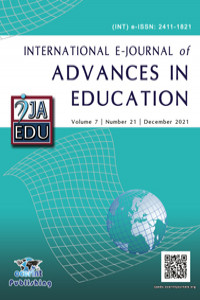Abstract
References
- 1. Bolovan, Paula Sorina (2007), Didactica istoriei: noi orizonturi în predarea, învăţarea şi evaluarea istoriei prin metode active (History teaching: new horizons in teaching, learning and evaluating history through active methods), PUC, Cluj-Napoca.
- 2. Cooper, Hilary (2002), History in the Early Years, Taylor & Francis e-Library.
- 3. Felezeu, Călin (2004), Didactica istoriei (History teaching), PUC, Cluj-Napoca.
- 4. Gruber, Gabriela (2016), Didactica istoriei și formarea competențelor (History teaching and skills training), Ed. Cetatea de Scaun, Târgoviște.
- 5. History in the curriculum (Sept. 2010). Vezi http://www.herrflynn.com/htai/docs/2012_docs/2012_eurydice_stats_history_europe_schools.pdf. Address accessed on August 3, 2021.
- 6. National education law (2011), no. 1, Title II, Art. 16, para. 1
- 7. Levstik, Linda; Barton, Keith (2001) Doing History. Investigating with Children in Elementary and Middle Scools, 2nd ed., London.
- 8. Low-Beer, Ann (1997) Consiliul Europei și Istoria în școală (The Council of Europe and School History), Strasbourg,.
- 9. National curriculum in England: history programmes of study, Department of Education, 11 September 2013. See https://www.gov.uk/government/publications/national-curriculum-in-england-history-programmes-of-study/national-curriculum-in-england-history-programmes-of-study. Address accessed on August 4, 2021
- 9. Planul cadru pentru învățământul primar (Framework Plan for Primary Education), București, 2013.
- 10. Programa școlară pentru disciplina Istorie (History School Curriculum for the Fourth Grade), clasa a IV-a, OMEN nr. 5003/02.12.2014, București, 2014.
- 11. Recomandarea 15 (2001) privind Predarea istoriei în Europa în secolul 21, Consiliul Europei (Recommendation 15 (2001) of the Committee of Ministers to Member States on History Teaching in Twenty-First-Century Europe), Strasburg, 31 oct. 2001, trad. Mihai Manea.
- 12. Recommendation of the European Parliament and of the Council of 18 December 2006 on key competences for lifelong learning, (2006/962/EC). See https://eur-lex.europa.eu/legal-content/RO/TXT/?uri=celex%3A32006H0962. Address accessed on August 6, 2021
- 13. Smart, Dean; Harnett, Penelope (2009), The History Curriculum in England: Contested Narratives, în Teaching History and Social Studies for Multicultural Europe, Ankara, pp. 99-116.
- 14. Yngve Skjæveland, Learning history in early childhood: Teaching methods and children’s understanding (2017), în Contemporary Issues in Early Childhood, Vol. 18(1) p. 8-22.
THE STUDY TOPIC OF HISTORY IN THE ROMANIAN PRIMARY EDUCATION CURRICULUM
Abstract
The present study analyzes the presence of History as a study topic in primary education in Romania, as reflected in the main curricular documents approved by the Ministry of National Education - Framework Plan for Primary Education (Bucharest, 2013), the School Curriculum for the Fourth Grade (Bucharest, 2014) respectively. From a structural point of view, it begins by arguing the importance of studying history in early childhood. Subsequently, the analysis focuses on Romania and captures the place of History in the curricular documents for primary education, the purpose of its study, the targeted competencies, including the contribution of the discipline to the formation of the eight key competencies established at European level. Finally, the information means by which the four general competencies are intended to be achieved are briefly described, as well as the methodological suggestions regarding the teaching, learning and assessment activities.
Keywords
Supporting Institution
Babes-Bolyai University Cluj-Napoca
References
- 1. Bolovan, Paula Sorina (2007), Didactica istoriei: noi orizonturi în predarea, învăţarea şi evaluarea istoriei prin metode active (History teaching: new horizons in teaching, learning and evaluating history through active methods), PUC, Cluj-Napoca.
- 2. Cooper, Hilary (2002), History in the Early Years, Taylor & Francis e-Library.
- 3. Felezeu, Călin (2004), Didactica istoriei (History teaching), PUC, Cluj-Napoca.
- 4. Gruber, Gabriela (2016), Didactica istoriei și formarea competențelor (History teaching and skills training), Ed. Cetatea de Scaun, Târgoviște.
- 5. History in the curriculum (Sept. 2010). Vezi http://www.herrflynn.com/htai/docs/2012_docs/2012_eurydice_stats_history_europe_schools.pdf. Address accessed on August 3, 2021.
- 6. National education law (2011), no. 1, Title II, Art. 16, para. 1
- 7. Levstik, Linda; Barton, Keith (2001) Doing History. Investigating with Children in Elementary and Middle Scools, 2nd ed., London.
- 8. Low-Beer, Ann (1997) Consiliul Europei și Istoria în școală (The Council of Europe and School History), Strasbourg,.
- 9. National curriculum in England: history programmes of study, Department of Education, 11 September 2013. See https://www.gov.uk/government/publications/national-curriculum-in-england-history-programmes-of-study/national-curriculum-in-england-history-programmes-of-study. Address accessed on August 4, 2021
- 9. Planul cadru pentru învățământul primar (Framework Plan for Primary Education), București, 2013.
- 10. Programa școlară pentru disciplina Istorie (History School Curriculum for the Fourth Grade), clasa a IV-a, OMEN nr. 5003/02.12.2014, București, 2014.
- 11. Recomandarea 15 (2001) privind Predarea istoriei în Europa în secolul 21, Consiliul Europei (Recommendation 15 (2001) of the Committee of Ministers to Member States on History Teaching in Twenty-First-Century Europe), Strasburg, 31 oct. 2001, trad. Mihai Manea.
- 12. Recommendation of the European Parliament and of the Council of 18 December 2006 on key competences for lifelong learning, (2006/962/EC). See https://eur-lex.europa.eu/legal-content/RO/TXT/?uri=celex%3A32006H0962. Address accessed on August 6, 2021
- 13. Smart, Dean; Harnett, Penelope (2009), The History Curriculum in England: Contested Narratives, în Teaching History and Social Studies for Multicultural Europe, Ankara, pp. 99-116.
- 14. Yngve Skjæveland, Learning history in early childhood: Teaching methods and children’s understanding (2017), în Contemporary Issues in Early Childhood, Vol. 18(1) p. 8-22.
Details
| Primary Language | English |
|---|---|
| Subjects | Other Fields of Education |
| Journal Section | Articles |
| Authors | |
| Publication Date | December 31, 2021 |
| Submission Date | November 6, 2021 |
| Published in Issue | Year 2021 Volume: 7 Issue: 21 |
Published and Sponsored by OCERINT International © 2015 - 2025
Contact: ijaedujournal@hotmail.com
International E-Journal of Advances in Education by IJAEDU is licensed under a Creative Commons Attribution-NonCommercial 4.0 International License. Permissions beyond the scope of this license may be available at http://ijaedu.ocerintjournals.org


